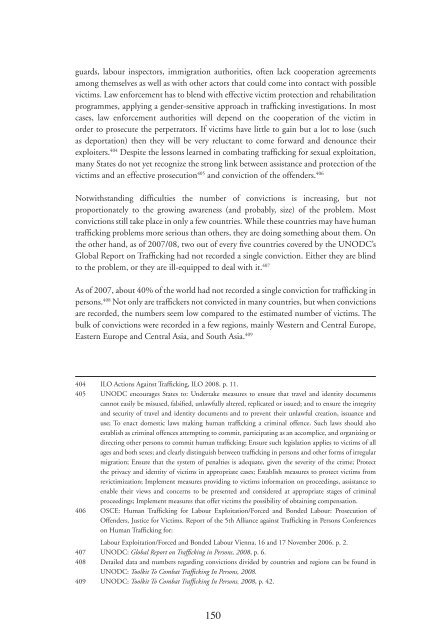Trafficking in human beings: human rights and ... - unesdoc - Unesco
Trafficking in human beings: human rights and ... - unesdoc - Unesco
Trafficking in human beings: human rights and ... - unesdoc - Unesco
Create successful ePaper yourself
Turn your PDF publications into a flip-book with our unique Google optimized e-Paper software.
guards, labour <strong>in</strong>spectors, immigration authorities, often lack cooperation agreements<br />
among themselves as well as with other actors that could come <strong>in</strong>to contact with possible<br />
victims. Law enforcement has to blend with effective victim protection <strong>and</strong> rehabilitation<br />
programmes, apply<strong>in</strong>g a gender-sensitive approach <strong>in</strong> traffi ck<strong>in</strong>g <strong>in</strong>vestigations. In most<br />
cases, law enforcement authorities will depend on the cooperation of the victim <strong>in</strong><br />
order to prosecute the perpetrators. If victims have little to ga<strong>in</strong> but a lot to lose (such<br />
as deportation) then they will be very reluctant to come forward <strong>and</strong> denounce their<br />
exploiters. 404 Despite the lessons learned <strong>in</strong> combat<strong>in</strong>g traffi ck<strong>in</strong>g for sexual exploitation,<br />
many States do not yet recognize the strong l<strong>in</strong>k between assistance <strong>and</strong> protection of the<br />
victims <strong>and</strong> an effective prosecution 405 <strong>and</strong> conviction of the offenders. 406<br />
Notwithst<strong>and</strong><strong>in</strong>g diffi culties the number of convictions is <strong>in</strong>creas<strong>in</strong>g, but not<br />
proportionately to the grow<strong>in</strong>g awareness (<strong>and</strong> probably, size) of the problem. Most<br />
convictions still take place <strong>in</strong> only a few countries. While these countries may have <strong>human</strong><br />
traffi ck<strong>in</strong>g problems more serious than others, they are do<strong>in</strong>g someth<strong>in</strong>g about them. On<br />
the other h<strong>and</strong>, as of 2007/08, two out of every fi ve countries covered by the UNODC’s<br />
Global Report on Traffi ck<strong>in</strong>g had not recorded a s<strong>in</strong>gle conviction. Either they are bl<strong>in</strong>d<br />
to the problem, or they are ill-equipped to deal with it. 407<br />
As of 2007, about 40% of the world had not recorded a s<strong>in</strong>gle conviction for traffi ck<strong>in</strong>g <strong>in</strong><br />
persons. 408 Not only are traffi ckers not convicted <strong>in</strong> many countries, but when convictions<br />
are recorded, the numbers seem low compared to the estimated number of victims. The<br />
bulk of convictions were recorded <strong>in</strong> a few regions, ma<strong>in</strong>ly Western <strong>and</strong> Central Europe,<br />
Eastern Europe <strong>and</strong> Central Asia, <strong>and</strong> South Asia. 409<br />
404 ILO Actions Aga<strong>in</strong>st Traffi ck<strong>in</strong>g, ILO 2008. p. 11.<br />
405 UNODC encourages States to: Undertake measures to ensure that travel <strong>and</strong> identity documents<br />
cannot easily be misused, falsifi ed, unlawfully altered, replicated or issued; <strong>and</strong> to ensure the <strong>in</strong>tegrity<br />
<strong>and</strong> security of travel <strong>and</strong> identity documents <strong>and</strong> to prevent their unlawful creation, issuance <strong>and</strong><br />
use; To enact domestic laws mak<strong>in</strong>g <strong>human</strong> traffi ck<strong>in</strong>g a crim<strong>in</strong>al offence. Such laws should also<br />
establish as crim<strong>in</strong>al offences attempt<strong>in</strong>g to commit, participat<strong>in</strong>g as an accomplice, <strong>and</strong> organiz<strong>in</strong>g or<br />
direct<strong>in</strong>g other persons to commit <strong>human</strong> traffi ck<strong>in</strong>g; Ensure such legislation applies to victims of all<br />
ages <strong>and</strong> both sexes; <strong>and</strong> clearly dist<strong>in</strong>guish between traffi ck<strong>in</strong>g <strong>in</strong> persons <strong>and</strong> other forms of irregular<br />
migration; Ensure that the system of penalties is adequate, given the severity of the crime; Protect<br />
the privacy <strong>and</strong> identity of victims <strong>in</strong> appropriate cases; Establish measures to protect victims from<br />
revictimization; Implement measures provid<strong>in</strong>g to victims <strong>in</strong>formation on proceed<strong>in</strong>gs, assistance to<br />
enable their views <strong>and</strong> concerns to be presented <strong>and</strong> considered at appropriate stages of crim<strong>in</strong>al<br />
proceed<strong>in</strong>gs; Implement measures that offer victims the possibility of obta<strong>in</strong><strong>in</strong>g compensation.<br />
406 OSCE: Human Traffi ck<strong>in</strong>g for Labour Exploitation/Forced <strong>and</strong> Bonded Labour: Prosecution of<br />
Offenders, Justice for Victims. Report of the 5th Alliance aga<strong>in</strong>st Traffi ck<strong>in</strong>g <strong>in</strong> Persons Conferences<br />
on Human Traffi ck<strong>in</strong>g for:<br />
Labour Exploitation/Forced <strong>and</strong> Bonded Labour Vienna, 16 <strong>and</strong> 17 November 2006. p. 2.<br />
407 UNODC: Global Report on Traffi ck<strong>in</strong>g <strong>in</strong> Persons, 2008, p. 6.<br />
408 Detailed data <strong>and</strong> numbers regard<strong>in</strong>g convictions divided by countries <strong>and</strong> regions can be found <strong>in</strong><br />
UNODC: Toolkit To Combat Traffi ck<strong>in</strong>g In Persons, 2008.<br />
409 UNODC: Toolkit To Combat Traffi ck<strong>in</strong>g In Persons, 2008, p. 42.<br />
150

















